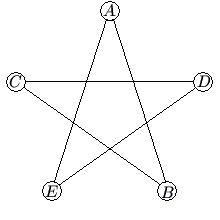2005 AMC 10A Problems/Problem 17
Contents
Problem
In the five-sided star shown, the letters ![]() and
and ![]() are replaced by the numbers
are replaced by the numbers ![]() and
and ![]() , although not necessarily in this order. The sums of the numbers at the ends of the line segments
, although not necessarily in this order. The sums of the numbers at the ends of the line segments ![]() ,
, ![]() ,
, ![]() ,
, ![]() , and
, and ![]() form an arithmetic sequence, although not necessarily in that order. What is the middle term of the arithmetic sequence?
form an arithmetic sequence, although not necessarily in that order. What is the middle term of the arithmetic sequence?
![]()
Solution
Each corner ![]() goes to two sides/numbers. (
goes to two sides/numbers. (![]() goes to
goes to ![]() and
and ![]() ,
, ![]() goes to
goes to ![]() and
and ![]() ). The sum of every term is equal to
). The sum of every term is equal to ![]()
Since the middle term in an arithmetic sequence is the average of all the terms in the sequence, the middle number is ![]()
Video Solution
https://youtu.be/tKsYSBdeVuw?t=544
~ pi_is_3.14
See Also
| 2005 AMC 10A (Problems • Answer Key • Resources) | ||
| Preceded by Problem 16 |
Followed by Problem 18 | |
| 1 • 2 • 3 • 4 • 5 • 6 • 7 • 8 • 9 • 10 • 11 • 12 • 13 • 14 • 15 • 16 • 17 • 18 • 19 • 20 • 21 • 22 • 23 • 24 • 25 | ||
| All AMC 10 Problems and Solutions | ||
The problems on this page are copyrighted by the Mathematical Association of America's American Mathematics Competitions. 










